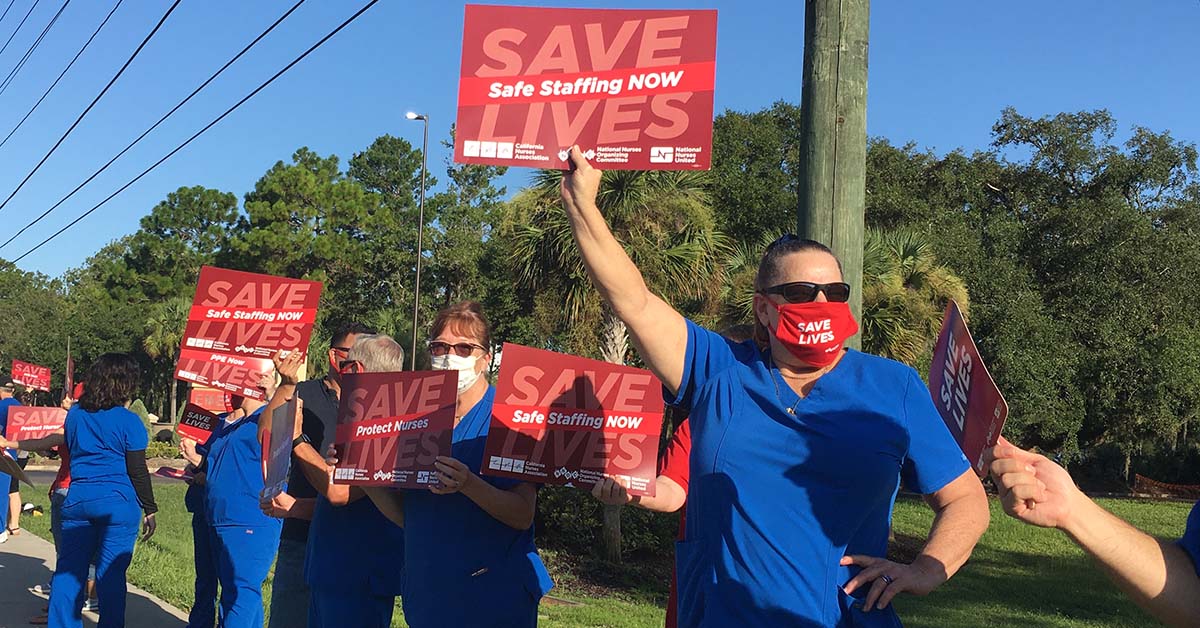Nurses urge federal government to address hospital staffing crisis

RNs participate in Congressional briefing on NNU staffing report
By Lucia Hwang
National Nurse Magazine - October | November | December 2021 Issue
“Understaffing is not the result of the nursing shortage, but the cause of it,” Zenei Triunfo-Cortez, RN, president of National Nurses United (NNU), told Congressional leaders in December.
Triunfo-Cortez and frontline RNs from across the country explained the understaffing crisis at a Congressional briefing, which accompanied the launch of a new NNU report, “Protecting Our Front Line: Ending the Shortage of Good Nursing Jobs and the Industry-created Unsafe Staffing Crisis.”
The RNs described firsthand to members of Congress the many ways that the hospital industry, in pursuit of profits, has intentionally created the intolerable working conditions under which many nurses are unwilling to practice and has led to current crisis levels of unsafe staffing. The briefing was co-hosted by Rep. Jan Schakowsky, sponsor of H.R. 3165, the Nurse Staffing Standards for Hospital Patient Safety and Quality Care Act.
“Right now, there are no federal mandates regulating the number of patients that a registered nurse can care for at one time in U.S. hospitals,” said Rep. Jan Schakowsky. “This is dangerous – for nurses, for patients, for all Americans. This is why I introduced the Nurse Staffing Standards for Hospital Patient Safety and Quality Care Act (H.R. 3165), to require hospitals to develop annual safe staffing plans with the input of direct care nurses.”
“Even before the pandemic,” Schakowsky continued. “Registered nurses have consistently been required to care for more patients than is safe. Nurses have been pleading with hospitals to give them the staff that they need. Yet hospitals say they cannot find enough nurses and cannot afford to pay permanent nurses more in wages. This comprehensive report shows that is incorrect. There is no shortage of registered nurses. There is a shortage of good, permanent nursing jobs where registered nurses are fully valued for their work. … If we truly value their work and their sacrifices, we must give them the support that they are asking for.”
This manufactured staffing crisis is detailed in NNU’s new report, which explains the methods the hospital industry has used for decades before the pandemic that have driven nurses away from the bedside, such as adopting policies of not supplying enough RN staff to safely care for patients; cutting corners at work that endanger nurses’ health and safety, including hospitals’ refusal to provide necessary PPE to RNs during the pandemic until they were forced to do so; disrespecting nurse judgment and autonomy by fragmenting, deskilling, and replacing aspects of their profession; and resisting hiring RNs from associate degree programs — an elitist practice that exacerbates the staffing crisis and undermines the nursing workforce’s racial and ethnic diversity.
The report explains how these hospital industry practices played out during the Covid-19 pandemic, and caused irreparable harm to registered nurses by creating unsafe workplaces that led to their mental health distress, moral injury, and hundreds of RN deaths.
Finally, the report proposes a number of immediate and long-term legislative and regulatory solutions that Congress and the executive branch could take to retain and grow the nursing workforce, including passing federal safe staffing ratios legislation to ensure appropriate staffing in our hospitals and making meeting minimum safe staffing requirements a condition of getting Medicare reimbursements; protecting RNs’ health and safety at work; strengthening union protections; expanding free, public community college nursing programs and beefing up financial assistance for nursing programs that improve workforce diversity — among other recommendations.
“These patients cannot be left alone,” said June Browne, RN, who works in the multi-system intensive care unit at Osceola Regional Medical Center in Kissimmee, Fla. and explained that ICU nurses who should typically be assigned only one or a maximum of two patients at her hospital were routinely assigned three and up to four patients on one shift. “But now I hear an alarm ringing in another room, letting me know something is wrong with another patient. What am I to do? Who do I help?”
The story is frighteningly similar around the country. Leah Rasch, RN, who works at Sparrow Hospital in Lansing, Mich., said her community is dealing with a massive surge of Covid patients but that management has provided “horrendous” staffing levels. “I simply cannot do my job well when I’m responsible for caring for eight Covid patients at one time,” said Rasch. “We are just trying to keep them breathing and keep them alive long enough to pass them off to the nurse on the next shift. It is heartbreaking to know that anyone is dying alone. I can’t tell you how brutal that is and how brutal it feels.”
All the nurses encouraged lawmakers to help pass NNU-endorsed current pending federal safe staffing bills, S. 1567 and H.R. 3165, as well as support the many recommendations outlined in NNU’s report.
Lucia Hwang is a communications specialist at National Nurses United.